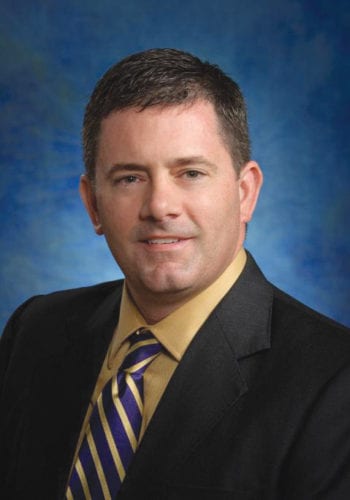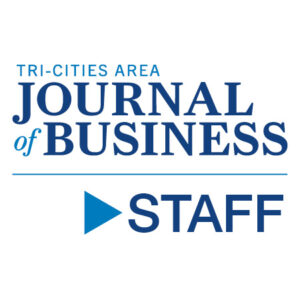
Home » Q & A with Adam J. Fyall
Q & A with Adam J. Fyall

May 14, 2020
Benton County Sustainable Development Manager

Number of employees you oversee: 3
You have a unique role in Benton County government. What do you oversee and how did your job come to cover such diverse areas?
I primarily manage our economic development, natural resources, intergovernmental affairs, Hanford-related and parks functions. While the county as a whole has around 700 employees, most of those reside in the law and justice departments. Administration is actually a very small organization, so there are a few of us with broad managerial portfolios.
How did you come to this kind of work?
Sometimes things just work out. When I left college in 1994, I had neither direction nor a plan. All I could rally to was that I felt most called to some form of public service. My circumstances at the county over the past quarter-century have been fortuitous. I found my way into a position that suits my personality well, allowing me a lot of freedom to work on a variety of projects to the benefit of the public good.
How has your approach evolved?
While I have always generally been a practical person, over time I have certainly become more pragmatic in regard to problem solving and management. I’ve learned how to not let the perfect be the enemy of the good, that there can be multiple ways to calculate what a winning outcome looks like, and how to play the long game where a war is made up of many battles. Accommodation and compromise are not bad, and a rising tide really can lift all boats. Now that I am working around and with people that are half my age, it’s interesting to observe how the arc plays out over the course of a career.
If you could wave a magic wand, what project or program would you institute in Benton County?
A backyard astronomer, nature-lover, and someone who just likes nighttime, if I had a magic wand, I would blanket all of Eastern Washington with a “dark sky” ordinance with the hope of reversing the light pollution that allows you to see the Tri-Cities from Vantage on a clear night. But since I’ve been given magic, I don’t want to do it with a heavy-handed ordinance. I’ll change the culture instead.
What is one characteristic that you believe every leader should possess?
There are some key differences between bosses and leaders. The former manages people while the latter inspires them. To this end, an essential quality of good leaders is empathy. Real empathy not only allows but requires you to see things from the perspectives of others and to care about what it is that you see. Show others that you are invested in them and their outcomes, and then you will be able to motivate and inspire.
What is the biggest challenge facing managers in the public sector today?
This is pretty mundane, but for us in local governments it really comes down to making sure the revenues and the expenditures balance. It is increasingly difficult, even in the relatively good economic times that we have enjoyed in recent years, to deliver the first class levels of service our public deserves with the revenue constraints local governments operate within. Fortunately at Benton County, we have some great people working every day to solve this enigma wrapped inside a riddle disguised as a puzzle.
Who are your role models or mentors?
Professionally, former Benton County senior land use planner Phil Mees comes to mind. Phil was instrumental in hiring me in the first place and was my supervisor at the county for the first four years. I admired how Phil had an interesting and varied professional life before he came to the county that informed his work perspectives to our collective benefit. He also had a rich and active life outside of work that I think further influenced my value for a healthy work-life balance. Phil is now retired in Hawaii, so he’s still role modeling.
How do you keep your employees motivated?
It’s no secret that work in the public sector can grind slowly and with a great deal of friction. It can be frustrating and can wear on morale and resolve, especially with some of the younger folks. I think it’s important to imbue your team and its members with agency and purpose so that they know they are valued. One of the concepts that has emerged in recent years and especially now during COVID that I bristle at is the idea of “essential” versus “non-essential” employees. I tell all of my employees from day one that they’re essential to my team. I also tell them that essentiality isn’t free, and that it requires maintenance. Whatever the endeavor—whether it’s your career, your marriage your church, or your beer league softball team—put in the work to make yourself essential and you will be valued as such.
How do you balance work and family life?
It’s not something that I have much trouble with, but I understand why it is difficult for a lot of people in similar lines of work. The phone, with its ball-and-chain of voicemails and emails is never far away, and often times the best thinking on a topic comes happen when you’re on a bike ride or pulling weeds. It can be a challenge to not be “on” all the time. I compartmentalize well and can set boundaries when I need to, but I also appreciate that I am fortunate to have the job that I do, and one cost of that good fortune is occasionally being inconvenienced on my own time.
Do you have a favorite project in Benton County?
One thing that immediately comes to mind is my satisfaction with the preservation of Hanford’s B Reactor and the associated creation of the Manhattan Project National Historic Park. While my role in that effort has been minuscule and insignificant, Benton County has been a frontline cheerleader from the beginning. I have watched this grassroots campaign to save, interpret and share this piece of world history span the entire arc of my career, and the work continues today. It has been a lesson in patience, fortitude and incrementalism that has paid off for this community and for history itself.
What’s your best time management strategy?
Hard deadlines. “The gallows doth beautifully concentrate the mind.”
What is your favorite podcast? Why was it meaningful to you?
I’m new to podcasts, but I found one that I really like right out of the gate. It’s called “History of English” and it is about the origins and development of the English language across time and place. Now at over 130 episodes it is an exhaustive survey that can get a bit dense and tedious at times, but if thorough and comprehensive are your thing, then this is for you. I particularly like that the creator is neither a historian nor linguist by profession or training. He’s a contracts lawyer and this is his hobby. I love the topic but I also like him. I like seeing people pursue and excel in their passions.
Q&A Local News Environment
KEYWORDS may 2020





